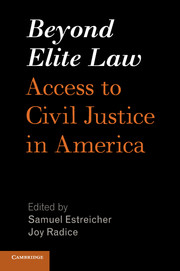Overview
Published online by Cambridge University Press: 05 May 2016
Summary
The United States has the best legal system in the world. Our adversarial system of justice requires opposing parties to present the best evidence for their respective arguments before an impartial judge or jury. It is critical, in making the system, that both sides are well-represented. Our system is imperiled, however, when the cost of legal assistance is so prohibitively expensive that litigants are forced to represent themselves pro se and to navigate the complicated legal system on their own. Today, more and more people are unable to afford the high cost of legal help in matters that impinge upon the basic essentials of life.
As Chief Judge of the State of New York, I see this scenario playing out all too often in our courtrooms each and every day. An unfair job termination, an unexpected illness or disability, or a wrongful foreclosure can deal a devastating financial blow to a working family. Many Americans do not understand how costly and out of reach legal services are until something calamitous happens in their lives. In New York and around the country, the current economic downturn, traumatic government spending cuts on the federal, state, and local level, and the impact of natural disasters like Superstorm Sandy only make access to justice more difficult for ordinary citizens. The number of Americans eligible for publicly funded legal assistance is at an all-time high, with 61.8 million people around the country living at or below 125% of the federal poverty line, but the funding levels are wholly inadequate to meet the need. For Americans who do not meet the criteria to qualify for legal aid, paying hundreds of dollars an hour for a lawyer is simply not a financially feasible option.
One of the major issues that we grapple with in court administration is that precisely when state budgets are tightened and reined in as the economy declines, the need for legal services has ballooned. Our mission in the courts to mete out justice to litigants regardless of economic station is preeminent and must transcend these developments. Equal justice is one of the central tenets of our justice system. The safeguards and protections built into the law do us no good if the average person cannot access the courthouse doors.
- Type
- Chapter
- Information
- Beyond Elite LawAccess to Civil Justice in America, pp. xxxi - xxxivPublisher: Cambridge University PressPrint publication year: 2016



